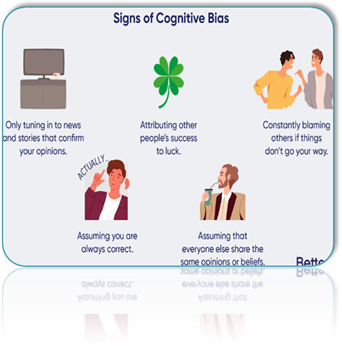- Actor-observer Bias
- Anchoring Bias
- Attentional Bias
- Availability heuristics
- Confirmation bias
- False consensus effect
- Functional fixedness
- Misinformation bias
- Optimism bias
- Self-serving effect
- Dunning-Kruger Bias

Cognitive biases can be caused by mental shortcuts, known as heuristics, emotions, peer pressure, selfish motivations and limited cognitive abilities, decreased cognitive flexibility, aging etc. A Cognitive bias may lead to distorted thinking at the same time work as an adaptive response by helping to take quick or instantaneous decisions especially during life threatening events. Cognitive Biases or suboptimal decision making approach to simplify the tenets of rationality or heuristics involve complex neural network (Limbic-frontal-prefrontal connections) working on the principle of Cognitive Association Principle. So, the neural networking of brain functions in a highly associative way using the basic operations of neural function such as correlation & coincidence detection. Brain networks looks associatively for relationships, coherence, links, and patterns within available info. Ex: Hebb’s Rule, Pavlovian conditioning, law of effect etc. Due to associative way of perception, prediction and understanding, our routine observations are forced to get arranged in an usual orderly pattern & relationships avoiding chaos, randomness, & inconsistency. Therefore, brain automatically & subconsciously hunt for coherent predictable connections. Cognitive heuristics/cognitive biases tend to arrange common observations present around in a regular, orderly relationship with an easily adaptable pattern of choice.

